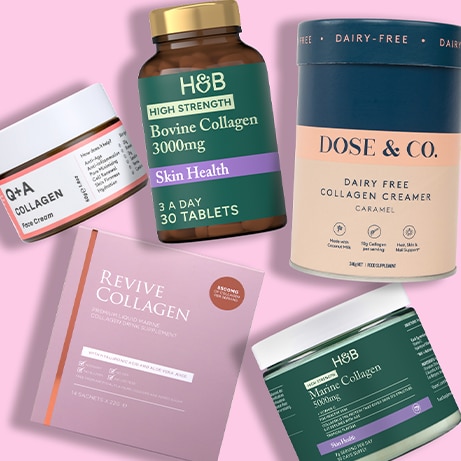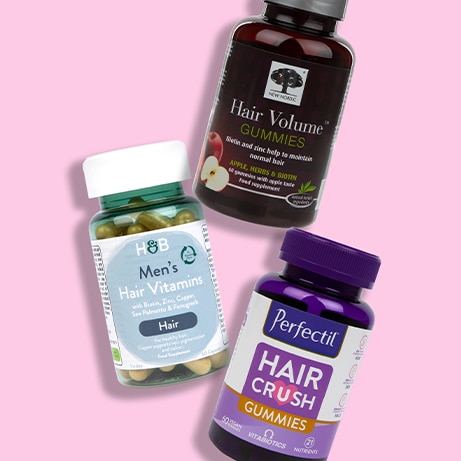15% off £25 or 20% off £35
Code:BASKET
8 easy ways to boost your collagen intake

Looking for small changes that could add up to a big impact? Here’s how you can make collagen part of your weekly routine, from supplements to recipes – with insights from an expert
Summary
1Why you could need more collagen in your life
As Alex points out, our natural collagen reserves start to decline from our mid-20s and it can be difficult to keep these topped up...
2How to bring collagen to your routine
Powdered collagen supplements pack a punch and often contain around 10g of collagen per serving. Opt for a versatile unflavoured...
3The final say
According to the experts, collagen now has so many proven benefits – and with so many ways to up your collagen intake, there’s no excuse...
You’re busy. We know it. So, why would you make time for collagen on a regular basis? Well, it’s pretty important – and not just for hair, nails and skin. “Collagen is a structural protein that helps to bring strength and elasticity to our important connective tissues – from our skin to our tendons,” says Alex Thompson, nutritionist at Holland & Barrett. Let’s find out how to boost your collagen knowledge, as well as your intake.
Why you could need more collagen in your life
As Alex points out, our natural collagen reserves start to decline from our mid-20s1 and it can be difficult to keep these topped up without supplements. There are many reasons why this happens, and they vary from person to person, including genetics, age, UV exposure and smoking.1 It’s also hard to get enough collagen from your diet alone – it’s mostly found in animal skin, bones and connective tissues,” says Alex. Hardly the most appetising options, when you put it like that.
It’s not just about getting enough, it’s also about making the most of it. Turns out, collagen isn’t directly absorbed as collagen by your body. Collagen-rich foods are digested as a protein and then broken down into different amino acids. From these amino acids and with help from other vitamins and minerals, your body then produces its own collagen – a process known as collagen synthesis.2
If you want to start improving your collagen intake – without adding ‘connective tissues’ to your menu – here are eight easy ways to achieve it.
How to bring collagen to your routine
1. Get some powder power
Powdered collagen supplements pack a punch and often contain around 10g of collagen per serving. Opt for a versatile unflavoured powder, a fruity option to complement your morning oats or a collagen protein powder in your pre- or post-workout shake.

2. Boil up (or buy) a bone broth
“The collagen from the animal or fish bones and connective tissue infuses into the broth, so it’s a much tastier and practical option than munching on bones directly!” says Alex. Each serving usually contains around 6g of collagen. “And if you want to add more collagen naturally into your diet, try leaving the skin on your chicken or whole sardines on toast.”
Why not try… ramen bone broth.
3. Take a supplement
The simplest and quickest way to support your collagen intake is via tablets, capsules or gummies. Some supplements contain other helpful ingredients like biotin (for healthy hair) and vitamin C, which helps collagen production. Plus, you can easily choose between marine, bovine or vegan options.
4. Add it to your skincare
Collagen is becoming a 'powerhouse' ingredient in moisturisers and serums, and when applied topically can help to improve skin appearance and suppleness. It’s often combined with other skin-loving ingredients like hyaluronic acid (which helps the skin to retain moisture) or magnesium that can help to tighten and brighten your skin.
5. Use it as a creamer
If you’re struggling to make habits stick, a collagen-infused creamer is for you. By adding this to your morning tea or coffee you’ll be ‘habit stacking’ – this involves stacking a new behaviour (taking a collagen supplement) onto a current behaviour (your morning tea/coffee), which means you’re more likely to stay on track.
6. Drink some drops
Struggle to swallow tablets? A liquid collagen option might be your best bet. Most contain around 5-10g of marine collagen, plus they often contain extra vitamins and minerals like vitamin C and hyaluronic acid. Just watch out for added sugars.

7. Whizz up a smoothie
Add something extra to your daily smoothie with a scoop of collagen powder. Perhaps let your favourite fruit do the talking and just sprinkle in a simple, unflavoured collagen. On the other hand, you could opt for the likes of berry, cherry or apple flavour.
Why not try apple collagen with banana, almond milk and cinnamon for a cinnamon bun taste-alike? Or blend together strawberries, berry collagen powder, vanilla protein and oat milk for a strawberries and cream inspired drink?
8. Mix it with water
Boost your morning routine by mixing an effervescent collagen tablet with your first glass of water. Not only helping you reach your hydration goals, effervescent options include skin and hair nutrients like zinc and selenium.
The final say
According to the experts, collagen now has so many proven benefits – and with so many ways to up your collagen intake, there’s no excuse to swerve this healthy habit.
Collagen powders pack a punch with around 10g per serving – and could potentially bring quicker benefits. If you’re always on the go, try a simple collagen capsule or gummy and keep them next to your keys so you never forget a dose.
Please check with your GP or healthcare professional before trying any supplements, treatments or remedies. Food supplements must not be used as a substitute for a varied and balanced diet and a healthy lifestyle.
The advice in this article is for information only and should not replace medical care. While collagen supplements have been extensively researched, particularly for skin and joint health, the evidence varies in strength and is inconclusive. Regulatory bodies like the EFSA have not yet authorised specific health claims for collagen supplements, indicating a need for further rigorous, large-scale studies. If considering collagen supplements, it is advisable to consult with a healthcare provider.
1. Varani J, Dame MK, Rittie L, Fligiel SEG, Kang S, Fisher GJ, et al. Decreased Collagen Production in Chronologically Aged Skin. The American Journal of Pathology [Internet]. 2006 Jun 1;168(6):1861–8. Available from: https://www.ncbi.nlm.nih.gov/pmc/articles/PMC1606623/
2. Collagen Synthesis - an overview | ScienceDirect Topics [Internet]. Sciencedirect.com. 2011. Available from: https://www.sciencedirect.com/topics/medicine-and-dentistry/collagen-synthesis












